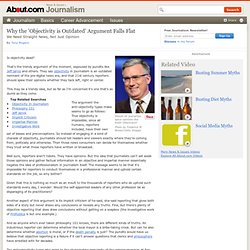

Thriving Journalism Today. Money suddenly made it quite easy to be a writer. Sixty grand is a lot when you live in a $500-a-month apartment, drive a fully paid-off Toyota and, because you are young, immortal and invulnerable, do not need health care. So with Wink Martindale as our patron, we set out to be artists. Katie drew cartoons. I wrote short stories and journalism. Journalism Thriving? Accuracy in Journalism.
The first three years of the Project’s work involved listening and talking with journalists and others around the country about what defines the work.

What emerged out of those conversations are the following nine core principles of journalism: 1. Journalism’s first obligation is to the truth Democracy depends on citizens having reliable, accurate facts put in a meaningful context. Accuracy and fact-checking in journalism. The importance of accuracy in journalism. The importance of accuracy in journalism Accuracy is essential in all journalism A media organisation will be judged on the accuracy and reliability of the journalism it produces.

It must be well-sourced, supported by strong evidence, examined and tested, clear and unambiguous. Verified facts must form the basis of all news, not rumour and speculation. Accuracy is essential if journalism is to inform the public debate. We don’t need to have the whole story, but we need to be totally transparent in declaring what we know and what we don’t know. Image courtesy of Roscoe Ellis and released under Creative Commons Speed and accuracy Accuracy comes ahead of speed.
Those who trust you will be prepared to wait for your version. Ten-Year-Old Florida Boy Commits Suicide After Being Sent to Room. A little after 5 p.m. yesterday, the parents of 10-year-old Tyriq Ammons sent him to his room for misbehaving.

Forty-five minutes later, his mother went to check on him. She opened the door to find her son hanging from a noose fashioned out of a videogame controller. Tampa Police are investigating the incident as a possible suicide. After the shocking discovery, the mother summoned a neighbor, who began performing chest compressions to try to revive the boy. Police arrived soon after and began CPR, but he never regained consciousness. Little else has been released about the case, including any possible mental health problems the boy might have had.
State: Missing boy's mom's death ruled suicide. The 21-year-old was found shot in the head at her grand-parents' home.

Her 2-year-old son disappeared two weeks ago. By JOHN FRANK Published September 10, 2006 LEESBURG - When the mother of a missing 2-year-old committed suicide Friday, it raised an overwhelming question: why? Authorities have said nothing more about a motive or a suicide note, but Melinda Duckett's adoptive parents said suicide didn't make sense. "If your child's missing, you don't commit suicide," Duckett's mother, Beth Eubank, told the Lockport Union-Sun & Journal in Lockport, N.Y. Jeff Jarvis. Journalism, Objectivity, Objectivity in News Reporting, Fox News, MSNBC. Is objectvity dead?

That's the trendy argument of the moment, espoused by pundits like Jeff Jarvis and others. They say objectivity in journalism is an outdated remnant of the pre-digital news era, and that 21st century reporters should spew their opinions whether they tack left, right or center. This may be a trendy idea, but as far as I'm concerned it's one that's as dumb as they come. The argument the anti-objectivity types make seems to go as follows: True objectivity is impossible, since all humans, reporters included, have their own set of biases and preconceptions. So instead of engaging in a kind of charade of objectivity, journalists should tell readers and viewers exactly where they're coming from, politically and otherwise.
Journalism Today. No matter how much this week’s Pulitzer Prize triumphalism hides it, the fact remains that journalism these days is “a disaster,” as Ted Koppel said recently. And unfortunately, retrospection dominates the news industry’s self-analysis. Online Journalism Blog. Aiding tomorrow's journalists today. Types of Journalism.
As of July 1, 2013 ThinkQuest has been discontinued.

Paparazzi penalties. The Return of Yellow Journalism. Just a few quick thoughts late in the evening.

In the 1970s, American History texts included a brief section on the "yellow journalism" of the nineteenth century. I wonder what today's textbooks have. Tonight, I thought on how we have yellow journalism once again. I've thought of this a few times lately, but tonight it hit me that sensationalism is really the norm, the way things naturally would be in most times and places. Breaking News (@BreakingNews) sur Twitter. Are the Reports of Mainstream Journalism’s Death Overstated? - Big Journalism.
News Sources: Biased? Critics of news outlets often note the “slant?

Of news outlets. They note that the news on these outlets is often overwhelmingly liberal or conservative. I understand how overt that can be in obviously political articles (the elections, national issues) but I thought it would be interesting to research how different non-political articles would be. The Most Biased Name in News.
Positivism. Positivism is a philosophy of science based on the view that information derived from logical and mathematical treatments and reports of sensory experience is the exclusive source of all authoritative knowledge,[1] and that there is valid knowledge (truth) only in scientific knowledge.[2] Verified data received from the senses are known as empirical evidence.[1] This view holds that society, like the physical world, operates according to general laws.

Introspective and intuitive knowledge is rejected. Although the positivist approach has been a recurrent theme in the history of Western thought,[3] the modern sense of the approach was developed by the philosopher and founding sociologist Auguste Comte in the early 19th century.[4] Comte argued that, much as the physical world operates according to gravity and other absolute laws, so also does society.[5] Etymology[edit] Overview[edit] Antecedents[edit] Auguste Comte[edit]